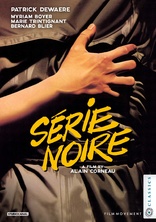Série Noire Blu-ray Movie
HomeSérie Noire Blu-ray Movie 
Film Movement | 1979 | 111 min | Not rated | Apr 14, 2020Movie rating
7.7 | / 10 |
Blu-ray rating
| Users | 0.0 | |
| Reviewer | 4.0 | |
| Overall | 4.0 |
Overview
Série Noire (1979)
Franck Poupart is a slightly neurotic door-to-door salesman in a sinister part of Paris' suburbs...
Starring: Patrick Dewaere, Myriam Boyer, Marie Trintignant, Bernard Blier, Jeanne HervialeDirector: Alain Corneau
| Foreign | Uncertain |
| Drama | Uncertain |
| Crime | Uncertain |
Specifications
Video
Video codec: MPEG-4 AVC
Video resolution: 1080p
Aspect ratio: 1.67:1
Original aspect ratio: 1.66:1
Audio
French: LPCM 2.0 Mono
Subtitles
English
Discs
Blu-ray Disc
Single disc (1 BD)
Playback
Region A (locked)
Review
Rating summary
| Movie | 4.0 | |
| Video | 4.5 | |
| Audio | 4.0 | |
| Extras | 2.5 | |
| Overall | 4.0 |
Série Noire Blu-ray Movie Review
Reviewed by Jeffrey Kauffman May 29, 2020The descriptor film noir is tossed about with pretty flagrant abandon a lot of the time, and that loosey-goosey atmosphere can tend to also inform discussions about how the term even came to be. French critic Nico Frank is regularly cited as having “invented” it, this despite the fact that at least one other writer on film used it in the same year of 1946 that Frank is credited with debuting the phrase, while there’s at least some cogent research suggesting that film noir had shown up as early as the late thirties in other French writing. That may put the lie to another theory that Frank’s “creation” of the term film noir was influenced by Série noire, a French publishing imprint which specialized in American crime fiction and which started supplying French bookshelves with product beginning in 1945. That publishing concern gave birth to a French anthology series in the 1980s, but a few years before the tv offering debuted, a French film based on a novel by American pulp writer Jim Thompson (The Grifters and The Getaway are culled from Thompson works) co-opted the title, even though Thompson’s original novel was entitled A Hell of a Woman. (One of the supplements on this release states that Thompson's novel was published by Série noire in France, though under the completely peculiar title of Des cliques et des cloaques.)
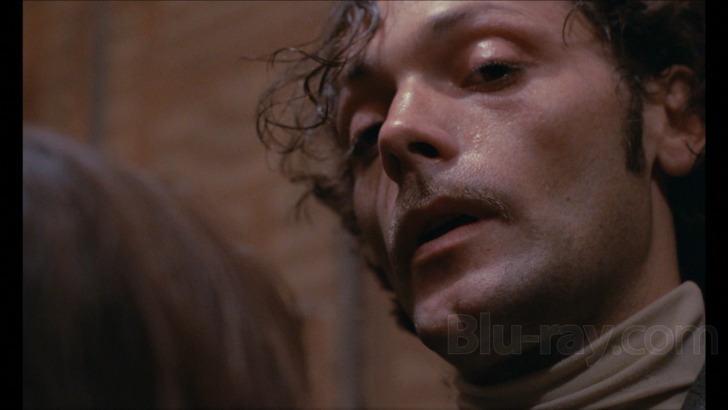
The fact that Série noire (the movie) is not going to be a "traditional" film noir is probably evident from the get go, with a title sequence that introduces focal character Franck Poupart (Patrick Dewaere, César nominated for this performance) who has parked his car in some kind of abandoned junkyard looking location in a torrential downpour, where he exits the car and begins a weird kind of dance that seems to be part martial arts and part spastic jerking, albeit with an imaginary partner. And indeed there's an almost bizarrely whimsical quality to at least some aspects of the story, with some of Poupart's actions arguably provoking as much laughter (however strained) as horror. Poupart's tendency to talk to himself is utilized throughout the film, and probably contributes almost subliminally to the comic feel of some of the proceedings.
Poupart is a door to door salesman, but he is also tasked with collecting debts, and an early elision sees him arriving at the home of a miserly elder known simply as the Aunt (Jeanne Herviale). It turns out he's actually on the hunt for a debtor named Tikides (Andreas Katsulas), whom Poupart seems to know worked for the Aunt, in a bit of unexplained plotting. Poupart had already spied a winsome young lady looking down on him from a second story window as he approached the Aunt's rather large domicile, and he makes some frankly slightly off color jokes about the young girl to the Aunt. Amazingly, instead of reacting with umbrage, she tells Poupart to wait there (again, in a torrential downpour), when suddenly the teen arrives.
Now is this new character going to be Série noire's femme fatale? Well, maybe, maybe not. In a rather shocking vignette, this young girl, not prone to saying much and only later briefly identifying herself as Mona (Marie Trintignant), takes Poupart into her bedroom, ostensibly (at least from Poupart's perspective) for him to show her some of his wares, though when Mona just strips naked without a word in front of him and then begins making amorous advances, what might have been a "traditional" (if hyberpolic) femme fatale move is instead discomfiting due to Mona's age, and also because Poupart, who actually rushes to cover up her nakedness, quickly realizes that the Aunt has been pimping Mona.
The film then just kind of weirdly segues to Poupart's home life with his harridan in training wife Jeanne (Myriam Boyer, César nominated for this performance). When the marriage goes south, and things at work with his boss Staplin (Bernard Blier, César nominated for this performance) also grow strained, Poupart finds himself drawn almost magnetically to Mona (in what is arguably one of this tale's most noir-ish aspects), and soon a plot is hatched to murder the Aunt and abscond with the rather sizable amounts of cash that she's stashed away as the "manager" of Mona's prostitution. This already incomplete summary at least gives the foundation for what ensues, but what's so often fascinating about Série noire is how it both utilizes and subverts what many would probably think of as noir building blocks. To give just one example of this, there's actually a reconciliation between Poupart and his wife at one point, which is placed structurally at a rather fascinating juncture in the story, but which then leads to its own devastating consequences.
Without posting any major spoilers, suffice it to say that while Poupart has a plan, of course things don't go according to it, and soon enough a relatively innocent bystander is sucked into the maelstrom. That finally tips Poupart over into even more "bad behavior", but what's kind of uneasily amusing is that all of the craziness doesn't actually end up completely destroying him. In that regard, the ending may simply indicate that Poupart's scoundrel ways are almost genetically prone to continue, even if there are various piles of bodies he's left in his wake.
Along with the acting nominations, Série noire also garnered nods in the Césars for screenplay (Alain Corneau and Georges Perec) and editing (Thierry Derocles), and Corneau, who also directed, was up for the Palme d’Or that year in Cannes, which may give some indication of how well the film was received in its native France. On this side of the pond, Série noire might be seen as presaging in a way the weird combo platter of comedy and noir elements which the Coens have exploited in a number of their films.
Série Noire Blu-ray Movie, Video Quality 
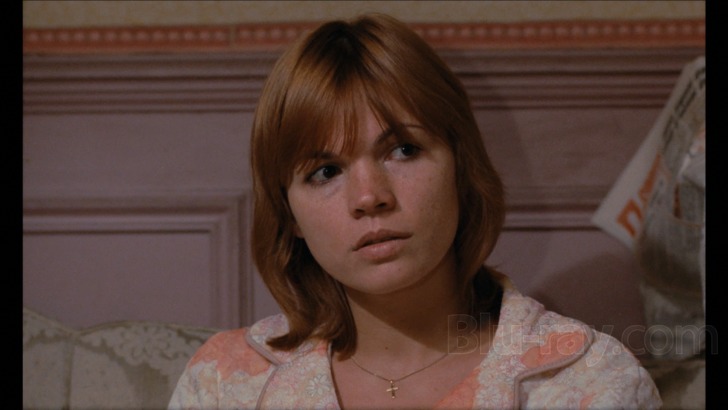
Série noire is presented on Blu-ray courtesy of Film Movement Classics, an imprint of Film Movement, with an AVC encoded 1080p transfer in 1.67:1. As often tends to be the case with Film Movement releases, the insert booklet offers only a generic "new 2K restoration" without providing any further information. A couple of other online sources, including our initial news post announcing this release, state this was a 4K restoration, but I personally have not been able to find any definitive information about either resolution and even StudioCanal's own site wasn't of much help. One way or the other, this is a largely very pleasing looking presentation, one with substantial amounts of fine detail in close-ups, and a generally excellent accounting of a somewhat downtrodden palette. My one slight qualm here is a kind of slightly blue undertone that attends a lot of scenes, notably some of the outdoor material, but that said, the film does tend to offer a glut of kind of gray, wintry environments, which may tend to emphasize those tones to begin with. There are a couple of pretty gritty looking dark scenes where grain spikes appreciably (notably one very dark scene in a car at just slightly past the one hour mark), and a somewhat lesser but still mottled, crosshatched look can even show up in some relatively brighter scenes (see screenshot 19), but for the most part grain resolves very naturally.
Série Noire Blu-ray Movie, Audio Quality 
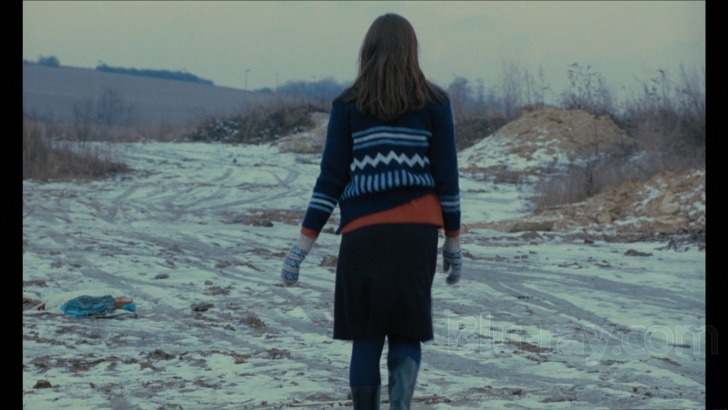
Série noire sports an LPCM 2.0 mono track in the original French (with optional English subtitles) that supports this dialogue (and monologue) heavy film perfectly well. There are a number of archival source cues, including "Moonlight Fiesta" by Duke Ellington, which is the same name shown as a subtitle on a copy of the screenplay seen in the Making of featurette mentioned below in the Supplements section. Some of those recordings of course are on the boxy, shallow sounding side, but the newly recorded elements all sound fine.
Série Noire Blu-ray Movie, Special Features and Extras 
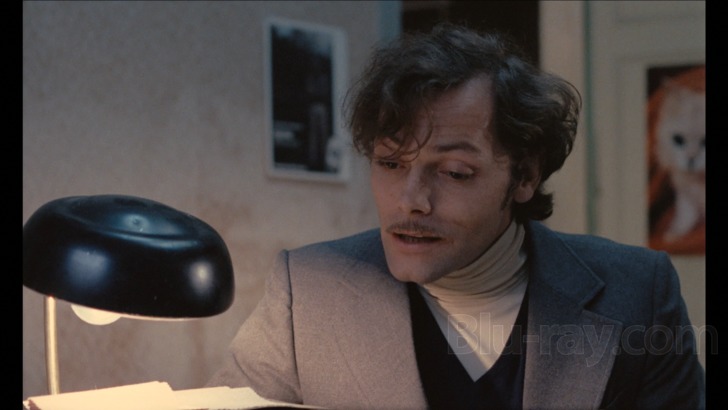
- Série noire : The Darkness of the Soul (1080p; 52:31) is a really engaging retrospective, featuring new and archival interviews which get into the genesis of the project and the filming.
- Interview with Alain Corneau and Marie Trintignant (480i; 30:06) is an archival piece from 2002, with the two (interviewed separately) remembering the film. For those who don't know, rather shockingly Trintignant was severely beaten by her boyfriend in 2003, which led directly to her death.
Série Noire Blu-ray Movie, Overall Score and Recommendation 
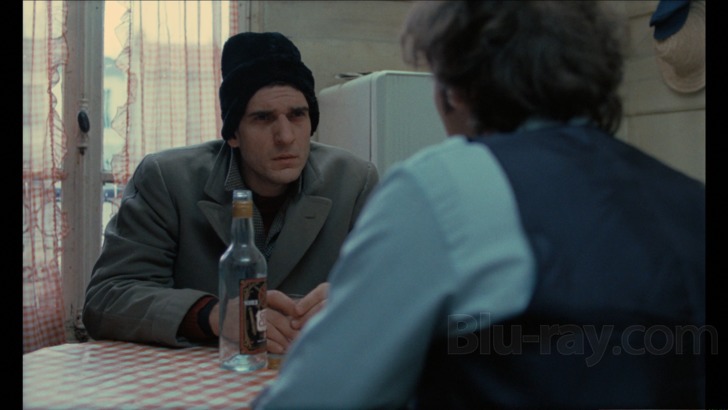
Série noire is appropriately dark, given that adjectival color in its very title, but it's also almost weirdly spry in some of its comical aspects. The film boasts excellent performances, a brisk pace, and some wonderfully outré situations that keep it pretty wildly unpredictable at times. Technical merits are solid, the supplementary package appealing, and Série noire comes Highly recommended.
Similar titles
Similar titles you might also like

Police Python 357
1976

Choice of Arms
Le choix des armes
1981

Quai des Orfèvres
1947

Diary of a Chambermaid
Le journal d'une femme de chambre
1964

Dheepan
2015

Pickpocket
1959

Pépé le Moko
1937

A Touch of Sin
天注定 / Tian zhu ding
2013

Fantomas: 5-Film Collection
Fantômas in the Shadow of the Guillotine / Juve vs. Fantômas / The Murderous Corpse / Fantômas vs. Fantômas / The False Magistrate
1913

La Haine
1995

Breathless
À bout de souffle
1960

Mississippi Mermaid
La sirène du Mississipi
1969

36th Precinct
36 quai des Orfèvres
2004

La vérité
The Truth
1960

The 400 Blows
Les quatre cents coups
1959

Bastards
Les Salauds / Slipcover in Original Pressing
2013

Casque d'Or
Golden Marie
1952

Soleil Ô
Oh, Sun
1967

Panique
Panic
1946

The Fire Within
Le feu follet
1963
